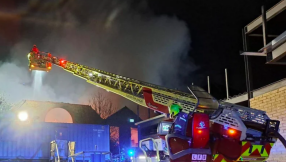Canon Sarah Snyder, the Archbishop of Canterbury's Advisor on Reconciliation, called on Mothers' Union members meeting at their General Meeting in Edinburgh to be ambassadors of reconciliation. She said that 'one of the most powerful tools for reconciliation is to show hospitality – not just to our friends, but to those outside our comfort zone'. Mothers' Union chief executive Bev Jullien responds.
Mothers' Union is a 140-year-old movement of Christians with over 4 million members worldwide, who are committed to putting their faith into action, by nurturing and supporting those in need, and working within their communities for lasting and sustainable transformation by enabling people to gain the skills and resources they need to take control of their own lives. Together, members touch the lives of over two thirds of a million people each year, of whom over 100,000 are in Britain and Ireland – so the 'comfort zone' is already quite wide.
Members may be best known in Britain for the 'ministry of the tea urn', but their ministry goes well beyond that – for example, in Britain alone, supporting prisoners and their families in over 85 prisons through crèches and family days, or feeding prisoners in other countries who would otherwise go hungry; providing parenting training including to prisoners, helping reduce domestic violence and abuse; aiding reconciliation within families; visiting the sick and elderly and delivering healthcare programmes.
Gender-based violence is a reality for members and women in their communities across the globe, and reducing this is core to both campaigning and practical action by Mothers' Union worldwide. It was when seeking to address this, especially the issue of sexual violence in conflict across Africa, that members asked us to support them in addressing the underlying issue of violent armed conflict. Across the world today, the World Bank estimates that more than 1.2 billion people are affected by some form of violence or insecurity, and the number of people displaced by conflict in 2014 was approaching a staggering 60 million, more than at the end of the Second World War.
While conflict affects all, women and children are uniquely affected making up the vast majority of displaced persons. Women and girls in conflicted-affected areas are more likely to be victims of slavery, rape, forced pregnancy and deliberate infection with HIV/Aids . Where women are involved in formal peace processes, the chances of peace agreements lasting more than 15 years goes up by 35 per cent – and for example in Sierra Leone, 55 per cent of former combatants said that women helped them to reintegrate in their communities after conflict.
Yet, between 1992 and 2011 only three per cent of signatories to peace agreements were women and between 1990 and 2010 only 16 per cent of agreements contained references to the needs and experiences of women.
So, as a movement, in response to the relative exclusion of women's voices, we are calling for them to be heard and their needs represented, in all areas and at all levels of peacebuilding and conflict resolution. We are also developing networks for mutual support of members and starting to provide skills and tools to enable them to be strong advocates at all levels, nationally and globally.
This is firmly anchored in the ongoing, practical work of members at the heart of their own communities, for example in South Sudan. Our work here focuses on literacy, financial education, and the setting up of savings and credit groups in communities. Programmes include men and women, irrespective of religion. Nearly 17,000 men and women have become literate and numerate through this, but perhaps most importantly in such a conflict-torn environment, these practical measures have resulted in increased resilience within the communities. External evaluators have commented: 'Mothers' Union is uniquely placed because it is "under the radar"... its emphasis on family relationships makes it acceptable and potent... and its gentleness of approach means that it can address questions which are "hard to touch" – they do not go away. They do not close their offices. Building peace and resilience within their communities is part of their ministry.'
In Britain, members are also addressing areas of need. For example, they offered holidays to disadvantaged families affected by Grenfell Tower – not immediately, but as and when families are ready, matching the type of break to the family's need.
So the foundations are already very strong! Over the coming 18 months, inspired by Bible stories, members across the world will be reflecting together on those strengths and the needs in our local communities, to step up to the challenge and ensure that we can continue to be ambassadors for Christ supporting families, the marginalised and disadvantaged, whoever and wherever they are.













